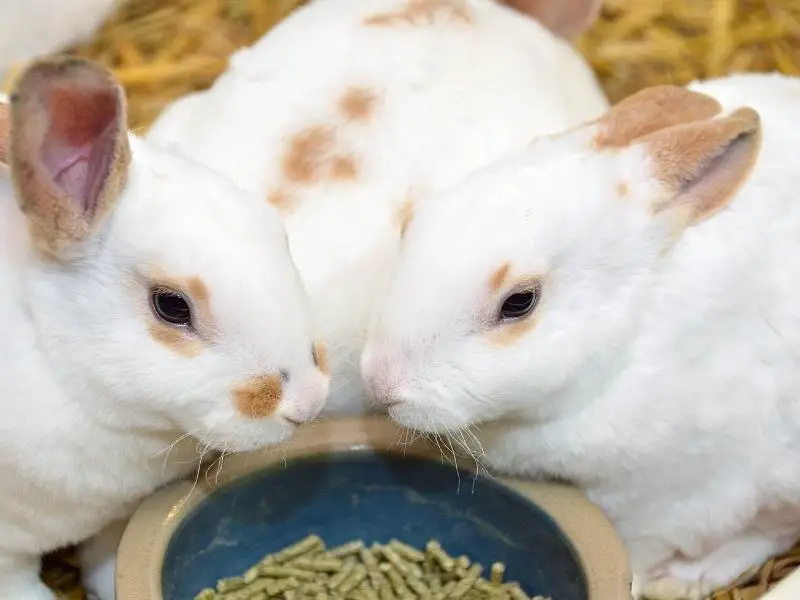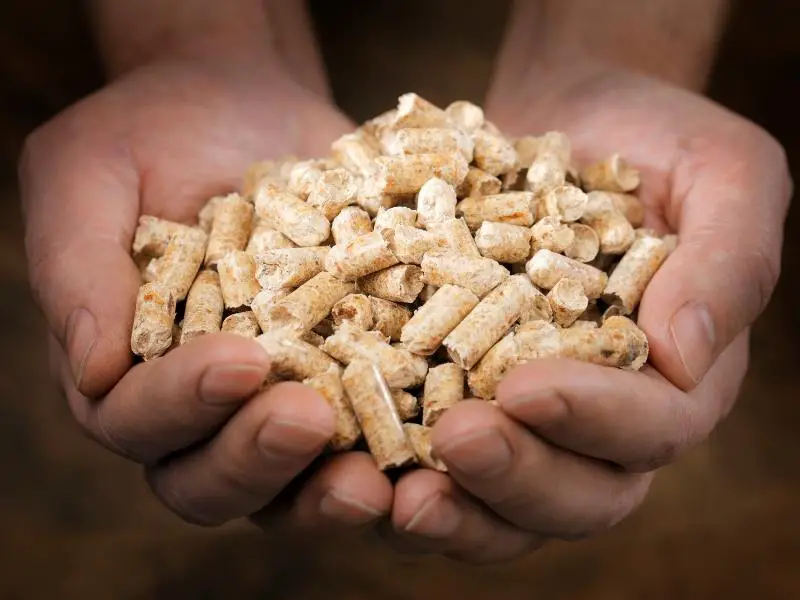Rabbit pellets are part of a healthy rabbit’s daily diet because they provide the essential macro and micronutrients your bun needs to be healthy. When you’ve bought rabbit pellets, you may wonder if rabbit pellets go bad.
Rabbit pellets can go bad if there’s moisture in the pellet packaging or in the container you store the pellets. Moisture causes mold to grow, and even just inhaling mold spores leads to respiratory illness. Rabbit pellets also “go bad” after the expiry date since the pellets lose their nutritional value.
So how can you make sure that the rabbit pellets you buy stay as fresh as they can for longer? And by the way, what exactly are good-quality rabbit pellets for Ms or Mr. Fluffles?
What Makes a Good Rabbit Pellet?
A good pellet for a pet rabbit is one that is high in quality and just plain and brown. But what does this mean exactly?
High-quality rabbit pellets should contain the right amount of fiber, protein, fat, and calcium. There also be no salad candy (i.e., dried corn, dried fruit, nuts, seeds, or other crunchy elements) in the pellets.
Rather opt for Timothy hay-based pellets for adult rabbits since these are lower in calories and higher in fiber than Alfalfa-based pellets.
The fiber in Rabbit Pellets
Ideally, the pellets you feed your fluffball should have a fiber content of 20% or more. However, some sources claim that a lower standard of 18% (or more) is good enough for bunnies.
Fiber is essential in a rabbit’s diet because of the fiber:
- Helps keep your bun’s digestive system moving, which in turn, keeps your rabbit healthy
- Creates a balanced gut environment, which helps prevent gastrointestinal stasis (GI stasis)
- Provides a rabbit with a large amount of the daily nutrients and calories they need
When checking the label on rabbit pellets, ensure that the minimum fiber content is a minimum of 18% or 20% of the nutritional content of the pellet formula.
Protein in Rabbit Pellets
The best quality rabbit pellets will have a protein content of 22% or more; however, lower standards state that 12-14% of protein is good enough for a bun.
Protein provides a rabbit with the energy they need. Too little protein means that a rabbit’s body will start using the protein in its muscles for energy, and this leads to muscle atrophy.
Even worse is that not enough protein means your bunny won’t be able to heal effectively from injuries or fight off infections.
Too much protein is just as dangerous because it leads to bacterial infections and a gut that’s imbalanced. The bun’s cecotropes will be mushy, and your pet rabbit is more likely to develop GI stasis.
Fat in Rabbit Pellets
The fat content in rabbit pellets should be 3% or less of the rabbit pellet formula. The fat content of 1% or less is better, however.
While fat is a healthy part of a rabbit’s diet, these mammals don’t need a lot of fat. Plus, their bodies can’t digest a lot of fat.
The little bit of fat that a rabbit needs help prevent illness. Fat also helps the rabbit’s body make the hormones they need for healthy brain function.
Common sources of fat in rabbit pellets are hemp oil, vegetable oils, and flaxseed.
Calcium in Rabbit Pellets
Another element to look out for in the rabbit pellets you buy is the calcium quantity.
Feed your rabbit pellets that have a calcium content of 0.5-1%.
Too much calcium is harmful to your rabbit as it can cause cardiac and kidney diseases. A calcium excess also means your rabbit won’t be able to absorb other essential nutrients that are needed for their growth and development.
On the other hand, a calcium deficiency leads to weakened bones and muscles, as well as dental disease.
What Nutrients Do Rabbit Pellets Have?

Rabbit pellets should have macro and micronutrients.
Macronutrients in Rabbit Pellets
Rabbit pellets should have these macronutrients:
- 12% or more protein
- 3% of less fat
- 18% or more fiber
- Look for complex carbs like soy, oats, wheat, hay, and barley, and preferably no simple sugars (like dried beet pulp, molasses, and/or fruit pieces)
Micronutrients in Rabbit Pellets
Rabbit pellets should have these micronutrients:
- 0.5-1% calcium
- Vitamin A
- Vitamin D
- Vitamin E
- Phosphate
- Sodium
- Potassium
- Chloride
- Magnesium
How Long Can You Store Rabbit Pellets?
You can generally store rabbit pellets for about 6 months, depending on the date of the expiry label on the pellet bag.
When storing the rabbit pellets, check for moisture in the bag. Moisture will cause the pellets to go moldy, and moldy pellets aren’t something you want to feed your beloved bun.
Also move your hand around the inside of the pellet bag to ensure there are no critters – bugs, weevils, or mites – to be found.
How Long Do Rabbit Pellets Last?
Rabbit pellets generally last for about 6 months from the date of packaging. However, that doesn’t mean you just assume the pellets are still okay 6 months from when you bought the rabbit pellets.
Always check the expiry label before you buy, especially if the pellets are on sale or sold at a discount.
You can feed your buns expired pellets (it is safe) but note that the nutritional value will decline as these pellets become stale.
How to Make Rabbit Pellets Last Longer?
There are a few ways you can make the rabbit pellets last a bit longer than the expiry date.
- Store the pellets in a place that’s cool and dry. Your pantry or basement are good options.
- Store the pellets in an airtight container.
Consider an airtight rabbit storage container that comes with a measuring cup, like the BPA-free TBMax Pet Food Container with Pour Spout.
There’s also the OXO Good Grips Pet Container range. The large square OXO rabbit pellet dispenser even comes with a scoop!
Or you can opt for a bulk container, like the Gamma2 Vittles Vault Outback Airtight Container (in 15, 25, 30, 35, 50, or 80-pound capacity) if you have a lot of rabbit mouths to feed.
A bulk portable option is the IRIS USA Airtight Food Storage Container (on wheels!) in 10, 25, or 50-pound capacities.
My Last Bunny Thoughts
Rabbit pellets are an essential part of the rabbit food you feed your bunny.
Ensure the pellets are of high quality to meet your bun’s nutritional requirements, check the expiry date, and store the pellets in a cool, dry, and/or airtight container to keep them fresh.
Related Articles:

